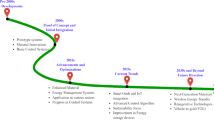Abstract
Renewable energy sources such as solar and wind are now competitive with traditional fossil and nuclear power “when generating” but that is just the challenge. When “not generating” can be a problem for grid integration and the main challenge to the widespread acceptance and dissemination of solar and wind, and the focus of research for the next generation of energy engineers. “Intermittent”, the adjective most associated with solar and wind energy has been and continues to be the focus of research by power engineers, AI professionals, and system scientists from the late 20th century and is the critical factor in the design of the future power grids,
The most obvious solution is energy storage but then the choice of the storage method and size are complex problems. Will best solutions involve pumped hydro, Li-Ion batteries, or hydrogen generation? Or will next-generation ultra-capacitors, or high-speed flywheels gyros, or some yet to be discovered device will be the dominating technologies? The primary objective of the storage designs will be based on what’s best for the reliability and efficiency of the grid, and simultaneously optimizing cost and environmental impact functions. Socio-economic and geopolitical considerations must also be considered to satisfy local or regional constraints. There is also the question of purpose: will it be sized for grid stability, or medium, or long-term storage. This factor will depend on the specific grid requirements. The focus of this paper is to study multi-source renewable energy systems that include storage called HRES or Hybrid Renewable Energy with Storage.
This study describes the development of a behind-the-meter Energy Management System (EMS) for an HRES, under the assumption that Real-Time Pricing (RTP) is offered by a utility supplying power to a medium-size office complex. A cost function to be minimized is introduced to optimize the contribution of each energy source. Also, this work develops the basis of a platform for decision-makers to evaluate the viability of the optimized system in conjunction with the financial feasibility analysis.
Access this chapter
Tax calculation will be finalised at checkout
Purchases are for personal use only
Similar content being viewed by others
References
Daniel A., Bohm B., Coughlin B.J., Layne M.: Evaluating implications of hydraulic fracturing in Shale gas reservoirs. In: SPE Americas E&P Environmental safety conference, San Antonio, TX, USA (2009)
Villaran, M.: Optimal planning and design of hybrid renewable energy systems for microgrids. Renew. Sust. Energy Rev. 70, 180–191 (2017). https://doi.org/10.1016/j.rser.2016.10.061
Billington, R.: Evaluation of different operating strategies in small standalone power systems. IEEE Trans. Energy Convers 20(3), 654–660 (2005). https://doi.org/10.1109/TEC.2005.847996
De Bosio, F., Luna, A.C., Ribeiro, L., Graells, M., Saavedra, O.R., Guerrero, J.M.: Analysis and improvement of the energy management of an isolated microgrid in Lencois island based on a linear optimization approach. IEEE (2016). https://doi.org/10.1109/ECCE.2016.7854871
Maleki, A., Aksarzadeh, A.: Artificial bee swarm optimization for optimum sizing of a stand-alone PV/WT/FC hybrid system considering LPSP concept. Sol. Energy 107, 227–235 (2014). https://doi.org/10.1016/j.solener.2014.05.016C
Shang, C., Srinivasan, D., Reindl, T.: An improved particle swarm optimization algorithm applied to battery sizing for stand-alone hybrid energy power systems. Electr. Power Energy Syst. 74, 104–117 (2016). https://doi.org/10.1016/j.ijepes.2015.07.009
Maleki, A., Khajeh, M.G., Ameri, M.: Optimal sizing of a grid independent hybrid renewable energy system incorporating resource uncertainty. Int. J. Electr. Power Energy Syst. 83, 514–524 (2016). https://doi.org/10.1016/j.ijepes.2016.04.008
Ramli, M.A.M., Bouchekara, H.R.E.H., Alghamdi, A.S.: Optimal sizing of PV/wind/diesel hybrid microgrid system using multi-objective self-adaptive differential evolution algorithm. Renew. Energy 121, 400–411 (2018). https://doi.org/10.1016/j.renene.2018.01.058
Phurailatpam, C., Rajpurohit, B.S., Wang, L.: Planning and optimization of autonomous DC microgrids for rural and urban applications in India. Renew. Sust. Energy Rev. 82, 194–204 (2018). https://doi.org/10.1016/j.rser.2017.09.022
Dufo-Lopez, R., Agustin, J.L.: Multi-objective design of PV-wind-diesel-hydrogen battery systems. Renew. Energy 33, 2559–2572 (2008). https://doi.org/10.1016/j.renene.2008.02.027
Katsigiannis, Y.A., Georgilakis, P.S., Karapidakis, E.S.: Multiobjective genetic algorithm solution to optimum economic and environmental performance problem of small autonomous hybrid power systems with renewables. IET Renew. Power Gener. 4(5), 404–419 (2010). https://doi.org/10.1049/iet-rpg.2009.0076
Pelet, X., Favrat, D., Leyland, G.: Multiobjective optimisation of integrated energy systems for remote communities considering economics and CO2 emissions. Int. J. Thermal Sci. 44(12), 1180–1189 (2005)
Elsied, M., Oukaour, A., Gualous, H., Brutto, O.A.L.: Optimal economic and environment operation of micro-grid power systems. Energy Convers. Manage. 122, 182–194 (2016). https://doi.org/10.1016/j.enconman.2016.05.074
Lyden, A., Pepper, R., Tuohy, P.: A modeling tool selection process for planning of community scale energy systems including storage and demand side management. Sust. Cities Soc. 39, 674–688 (2018). https://doi.org/10.1016/j.scs.2018.02.003
“The National Solar Radiation Data Base (NSRDB)”. https://nsrdb.nrel.gov/
“Pacific Gas and Electric, PG and E.” https://www.pge.com/Utility
Rate Database (URDB). https://openei.org/
Yang, H., Wei, Z., Chengzhi, L.: Optimal design and techno-economic analysis of a hybrid solar–wind power generation system. Appl. Energy 86(2), 163–216 (2009)
Author information
Authors and Affiliations
Corresponding author
Editor information
Editors and Affiliations
Rights and permissions
Copyright information
© 2022 The Author(s), under exclusive license to Springer Nature Switzerland AG
About this paper
Cite this paper
Cupples, S., Abtahi, A., Madureira, A., Quadrado, J. (2022). Techno-Economic Feasibility Analysis and Optimal Design of Hybrid Renewable Energy Systems Coupled with Energy Storage. In: Abraham, A., et al. Innovations in Bio-Inspired Computing and Applications. IBICA 2021. Lecture Notes in Networks and Systems, vol 419. Springer, Cham. https://doi.org/10.1007/978-3-030-96299-9_74
Download citation
DOI: https://doi.org/10.1007/978-3-030-96299-9_74
Published:
Publisher Name: Springer, Cham
Print ISBN: 978-3-030-96298-2
Online ISBN: 978-3-030-96299-9
eBook Packages: Intelligent Technologies and RoboticsIntelligent Technologies and Robotics (R0)




